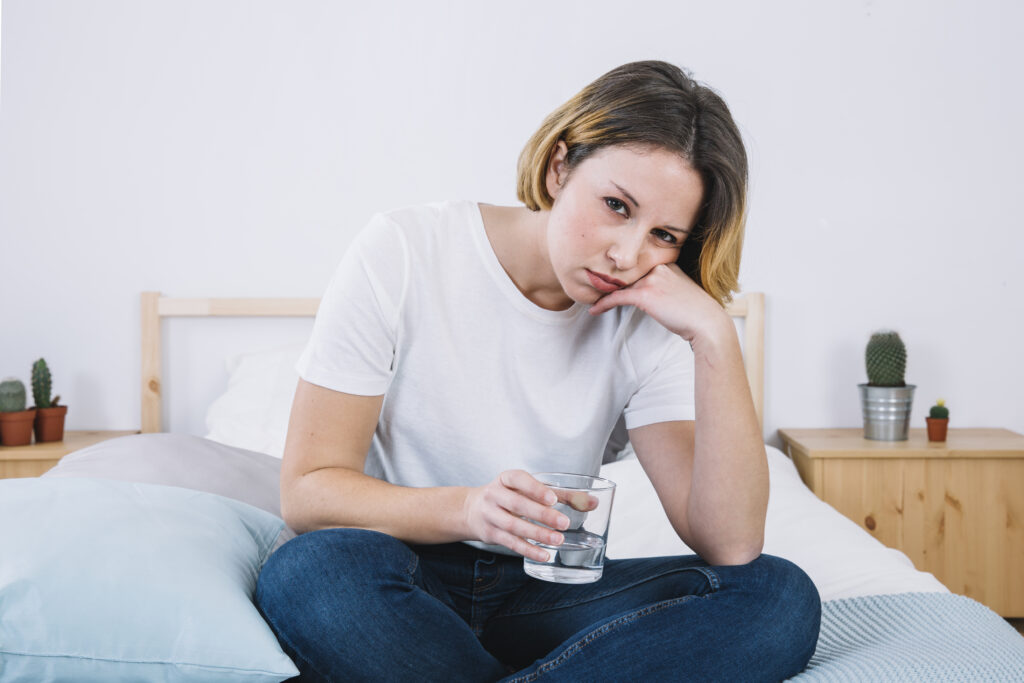
The issue can affect millions of people worldwide. However, for women, it could be particularly troublesome due to the reasons related to their physiology and hormones. Factors like pregnancy and menstruation can increase its chances.
This blog post offers important hydration tips, including information on electrolyte drinks and water mixtures that can help your body regain wellness. Women can get glass skin by hydrating their bodies, covering all five signs of dehydration in women, and knowing how to identify and overcome them.
Before discussing symptoms, it is important to explain fluid deficiency. It occurs when the body lacks the fluids necessary for proper function. The body consists of roughly 60% fluids, and with daily activities like sweating, urination, and even breathing, these fluids must constantly be replaced. Insufficient fluid intake can lead to several health issues, including a lack of water.
Mild and severe it exist, and complications are bound to arise if issues are not dealt with early on.
Menstruation, hormonal changes, and pregnancy can intensify fluid loss, leading to various symptoms. Women may notice dry, cool skin and leg cramps due to involuntary muscle contractions.
To alleviate these symptoms, drink plenty of water throughout the day. Keep a water bottle handy and sip regularly, especially during physical activity or in hot weather.
Many people don’t realize the 5 sneaky signs of dehydration you’re ignoring every day until they start feeling weak.
Stretching and massaging sore muscles can provide relief from cramps and spasms. Try gentle exercises like yoga or walking, and consider electrolyte-rich drinks to replenish lost nutrients.

It lowers blood volume, decreasing blood circulation through the body and organs. This results in higher fatigue levels in most people. Fluid deficiency and concentration symptoms are also noted at home and in the workplace. The 5 sneaky signs of dehydration you’re ignoring every day can affect your skin, energy, and overall health.
Drinking lots of fluids helps combat fatigue. As a last resort, eating watermelon and oranges helps if they are around.
Moreover, an electrolyte solution can help maintain energy for exercise or hot conditions.
To make your own, add a pinch of salt and some lemon juice to the water. Foods with high amounts of water will significantly boost hydration levels. Good candidates for fruits and vegetables include celery, strawberries, cucumbers, and watermelons. In the colder months, broth or soup has hydrating properties. here are 7 effective ways to drink water for skin health.
If drinking wine or coffee, hydrate with water to maintain fluid levels. These drinks fulfill the requirements of water.
Moderate- to high-level activities are more strenuous and cause a lot of sweating, leading to loss of fluids. In this case, water is insufficient, and electrolyte drinks must be consumed to replace the minerals lost during exercise.
Hydration is equally important in pregnancy, as insufficient hydration can give rise to complications such as low amniotic fluid levels or even preterm labor.
Some women of childbearing age may notice that a lack of liquid intake worsens bloating, period cramps, and even menstrual fatigue. Drinking plenty of water during the period, however, aids in reducing these complications and maintaining general health.
Drink at least 8-10 glasses of water per day, adjusting according to your needs. Your age, sex, weight, and activity level impact your fluid requirements. Climate and physical activity also play a role.
Keep a water bottle handy and sip throughout the day. Add fruits or herbs for a refreshing twist. Cucumber, lemon, and mint are popular choices. Doctors say the 5 sneaky signs of dehydration you’re ignoring every day often appear slowly, so you may miss them.
Check your urine output to gauge your hydration levels. Pale yellow or clear urine indicates you’re on track. Dark yellow or amber-colored urine means you need more fluids.
Include water-rich foods like watermelon, cantaloupe, and celery in your diet. Fresh fruits and veggies in Pakistan can help maintain your body’s fluid balance.
Start small by drinking a glass of water as soon as you wake up. It’ll kickstart your metabolism and rehydrate your body. Make it a habit.
Replace sugary drinks with infused water or herbal tea. It’s a simple swap that’ll reduce your sugar intake. Try it today! If you notice any of the 5 sneaky signs of dehydration you’re ignoring every day, it’s important to drink more water.
Incorporate short walks into your daily routine, like taking a stroll after dinner. It’s a great way to boost circulation and energy. Start with 10-15 minutes a day.
Eat more fruits and veggies in your meals, like adding spinach to your omelette or having a fruit salad for dessert. It’s an easy way to get essential nutrients. Give it a try!
A woman’s overall health can suffer when her body lacks sufficient fluids, leading to symptoms like tiredness, dizziness, dry skin, headaches, and dark-colored urine. Hormonal changes, pregnancy, breastfeeding, and an active lifestyle can increase the body’s need for fluids. Maintaining adequate fluid levels is simpler than it seems. Drinking water, eating water-rich foods, and recognizing early signs of fluid loss can help a woman stay on track.
If such symptoms persist after trying to increase fluid intake, seeing a doctor is advisable because a severe hydration imbalance might need specialized treatment. Maintaining fluid balance can significantly improve energy levels, skin condition, and overall health. Remember: one of the best tips is ‘when in doubt, drink water.’
What are 10 signs of dehydration?
Dark urine, dizziness, dry mouth, fatigue, headache, muscle cramps, sunken eyes, rapid heartbeat, confusion, and infrequent urination. Severe cases may cause fainting or low blood pressure. Skin elasticity loss is another key indicator.
2. Which diseases cause hydration imbalance in adults?
Diabetes (especially with high blood sugar), kidney disease, cholera, severe diarrhea illnesses like norovirus, and Addison’s disease. Certain cancers and eating disorders also increase risk substantially.
3. What are 10 fluid deficiency signs specific to adults?
Includes extreme thirst, no sweat production, bad breath, food cravings (especially sweets), chills, constipation, and persistent muscle weakness. Older adults may show delirium or sudden cognitive changes.
4. How does hydration imbalance manifest differently in women?
Hormonal fluctuations increase vulnerability—look for menstrual irregularities, UTIs, breast tenderness, and worsened PMS symptoms. Pregnant women may experience Braxton Hicks contractions or dizziness when standing.
5. What are the symptoms of water absorption problems?
Frequent urination shortly after drinking (diabetes insipidus), ongoing thirst despite high intake, and electrolyte imbalances. Stool may appear oily (malabsorption disorders) or unusually pale.
6. What are the 5 most critical fluid deficiency signs?
7. What indicates chronic dehydration?
Constant fatigue, dry/flaky skin, recurring headaches, poor concentration, and joint stiffness. May lead to kidney stones, urinary infections, or hypertension if unaddressed long-term.
8. What are the severe consequences of prolonged fluid deficiency?
Kidney failure, seizures, hypovolemic shock, heat stroke, and, in extreme cases, coma. Chronic inflammation increases the risk of dementia, arthritis, and premature aging. Digestive issues like ulcers are also common.
9. How much water should women drink daily to prevent dehydration?
On average, women should drink about 2.7 liters (11.5 cups) of water per day. This includes water from beverages and foods. Drinking enough water helps prevent hydration imbalance symptoms like fatigue, dry skin, and dizziness. “Hydration is the key to glowing skin and better health. For more tips on how water intake enhances your skin, read this guide on 7 ways of drinking water for skin health.”
10. What are the early signs of fluid deficiency in women?
Early signs of hydration imbalance in women include dry skin, headaches, dark yellow urine, and fatigue. These symptoms can worsen without adequate water intake, so women need to monitor their hydration regularly. Learning the 5 sneaky signs of dehydration you’re ignoring every day helps you stay healthy and hydrated.
No comments yet. Be the first to comment!
You must be logged in to post a comment.

Recent Comments